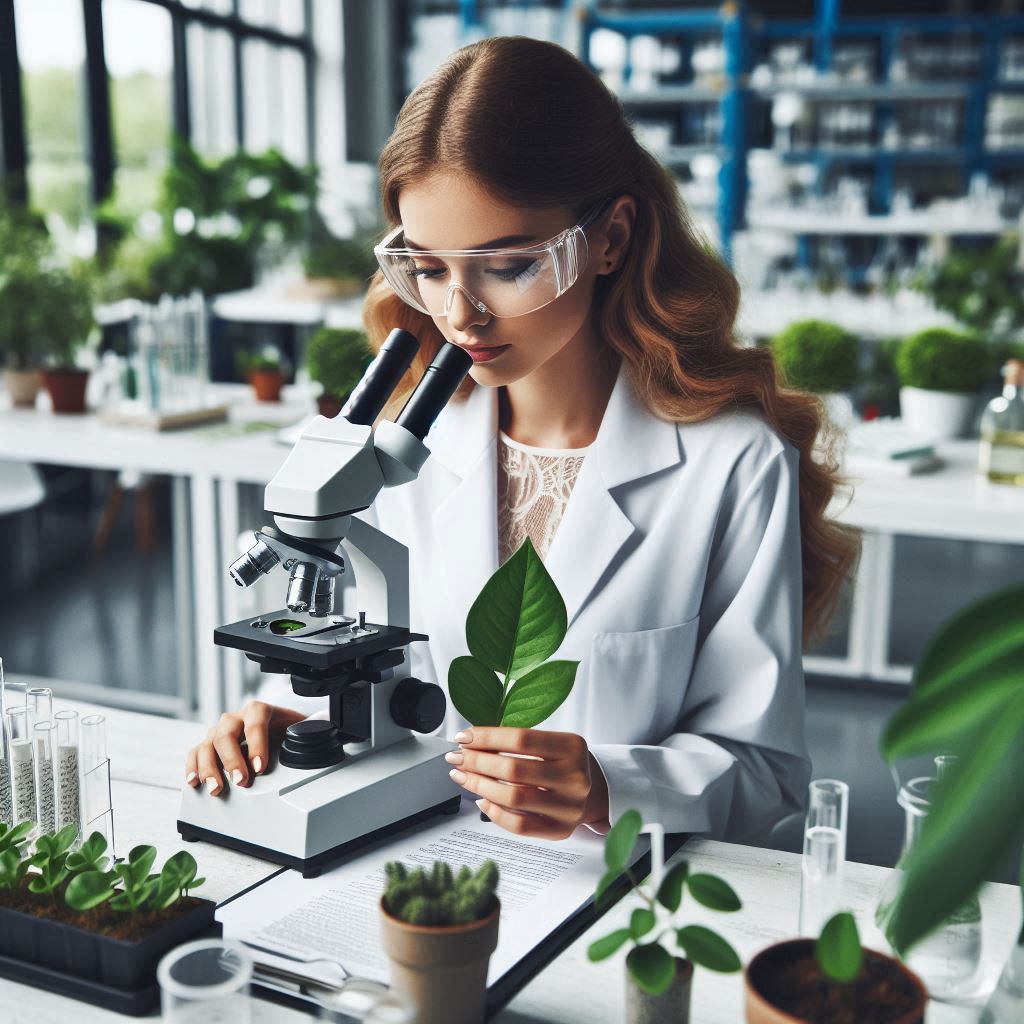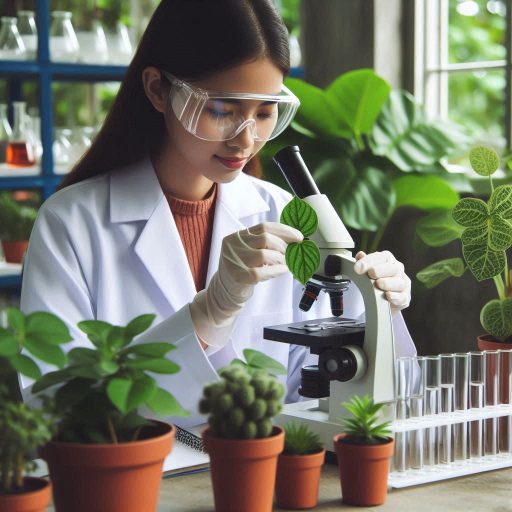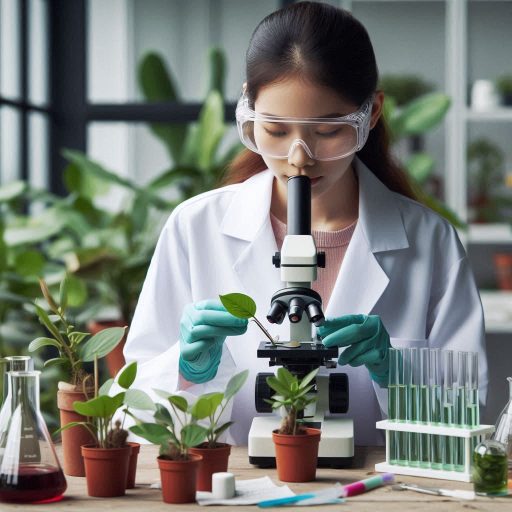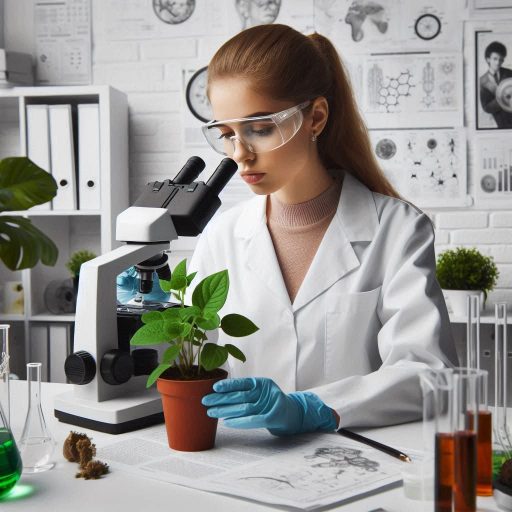Introduction
A plant science degree offers numerous benefits for students and society.
This field of study focuses on understanding plants and their roles in ecosystems.
Graduates acquire knowledge about plant biology, genetics, and sustainable agricultural practices.
Education in plant sciences plays a crucial role in addressing global challenges.
As the world faces issues like climate change and food insecurity, knowledgeable professionals are essential.
Plant scientists work to develop resilient crops and sustainable farming techniques.
Their expertise helps ensure a stable food supply for growing populations.
Moreover, plant science education fosters critical thinking and research skills.
Students engage in hands-on experiences that prepare them for real-world applications.
These experiences enhance their understanding of complex plant systems and ecological relationships.
In addition, plant science graduates find diverse career opportunities.
They can work in research, agriculture, environmental conservation, and education.
Their skills are in high demand across various industries.
Pursuing a plant science degree equips individuals with valuable knowledge and skills.
This education is vital for addressing pressing environmental and societal issues.
Aspiring students should consider the numerous benefits of a plant science degree as they plan their futures.
Diverse Career Opportunities
A plant science degree opens doors to a wide range of career opportunities.
Graduates can pursue roles in agriculture, research, education, and environmental conservation.
The versatility of a plant science degree makes it an attractive option for students passionate about plants and their ecosystems.
Various Career Paths Available to Individuals with a Plant Science Degree
One popular career path is in agriculture.
Plant scientists contribute to developing sustainable farming practices.
They help improve crop yields and reduce environmental impact.
Roles in agricultural research include working with seed companies and agricultural organizations.
These professionals often focus on crop genetics and pest management.
Another significant field is horticulture.
Horticulturists work in nurseries, botanical gardens, and landscaping firms.
They specialize in growing flowers, fruits, and ornamental plants.
Horticulturists may also work on landscape design or urban gardening projects.
Their expertise helps enhance green spaces in urban environments.
Plant science graduates also find opportunities in environmental science.
They can work for governmental agencies and nonprofit organizations focused on conservation.
These roles may involve studying plant ecosystems, restoring habitats, and managing natural resources.
Environmental consultants often assess the impact of development projects on local flora.
Research and academia represent another career path for plant science graduates.
Many pursue advanced degrees to become university professors or researchers.
They contribute to cutting-edge studies in plant biology, genetics, and ecology.
These positions often involve securing funding for research projects and publishing findings in scientific journals.
Specific Industries Where Plant Scientists Are in High Demand
The pharmaceutical industry is another area where plant scientists are in high demand.
They study medicinal plants and their compounds for potential drug development.
This research can lead to new treatments for various health conditions.
Professionals in this field may work in laboratories or collaborate with pharmaceutical companies.
Moreover, plant science graduates can work in the food industry.
They help ensure food quality and safety through research and development.
Positions in food technology involve improving crop resilience and nutrition.
These professionals may also focus on sustainable food production methods.
Additionally, botanical institutions and conservation organizations seek plant scientists.
They conduct research on plant species and their habitats.
These professionals may also work on conservation projects to protect endangered plants.
Finally, entrepreneurship is an option for plant science graduates.
Many start their businesses, such as organic farms, plant nurseries, or consulting firms.
This path allows individuals to apply their knowledge creatively and sustainably.
A plant science degree offers diverse career opportunities across various industries.
Graduates can find fulfilling roles in agriculture, horticulture, environmental science, research, pharmaceuticals, and food technology.
With increasing demand for sustainable practices and conservation efforts, the need for skilled plant scientists continues to grow.
Read: U.S. Cities with the Most Opportunities for Environmental Scientists
Focus on Sustainability
A plant science degree equips individuals with the knowledge and skills necessary to promote sustainability in agriculture.
Graduates learn how to improve crop production while minimizing environmental impact.
This degree focuses on developing innovative solutions to meet growing global food demands while conserving natural resources.
How a Plant Science Degree Equips Individuals with the Knowledge and Skills to Promote Sustainability in Agriculture
Through a plant science program, students study plant biology, soil science, and ecological systems.
These courses teach them how to manage agricultural resources efficiently.
For example, students learn sustainable farming techniques that reduce water and pesticide usage.
They also study crop rotation, organic farming, and integrated pest management, which help maintain soil health and biodiversity.
Plant science graduates also gain practical skills in developing resilient crop varieties.
These crops can withstand extreme weather conditions like drought or flooding.
By breeding plants that require less water and fewer chemicals, graduates promote more sustainable agricultural practices.
This knowledge is critical as climate change impacts global food production.
Additionally, plant science programs emphasize precision agriculture.
Graduates learn to use technology, such as drones and sensors, to monitor crop health and optimize resource use.
Precision agriculture reduces waste and improves efficiency, further supporting sustainability efforts.
Importance of Sustainable Practices in Food Production and Environmental Conservation
Sustainable practices in food production are essential for preserving the environment and ensuring long-term food security.
As the global population grows, the demand for food increases.
However, conventional farming practices can deplete natural resources, degrade soil, and contribute to pollution.
Sustainable agriculture offers a solution by balancing productivity with environmental conservation.
Plant science professionals play a crucial role in promoting sustainable farming techniques that protect ecosystems.
For instance, they help reduce the use of harmful pesticides and fertilizers that contaminate water sources.
They also advocate for no-till farming, which minimizes soil erosion and maintains soil structure.
By adopting these practices, farmers can produce food more sustainably while reducing their carbon footprint.
Moreover, sustainable food production ensures that future generations will have access to nutritious, affordable food.
Plant science graduates work to develop crops that are more resilient to climate change and resource scarcity.
These innovations help secure a stable food supply while mitigating environmental damage.
In terms of environmental conservation, sustainable practices contribute to biodiversity preservation.
Plant scientists encourage crop diversification, which supports the health of ecosystems.
Diverse plant species provide habitats for wildlife and enhance pollinator populations.
This, in turn, strengthens food systems by improving plant reproduction and growth.
A plant science degree empowers individuals to lead sustainability efforts in agriculture.
Graduates promote practices that protect the environment and ensure long-term food security.
Their knowledge and skills are essential in addressing global challenges related to food production and environmental conservation.
By focusing on sustainability, plant scientists contribute to a healthier planet for future generations.
Read: Environmental Scientist vs. Ecologist: Roles and Differences in the US
Research Opportunities
Plant science graduates enjoy numerous research opportunities that drive advancements in agriculture, ecology, and biotechnology.
Their education prepares them to tackle complex challenges related to food security and environmental sustainability.
With a strong foundation in plant biology and related disciplines, these graduates can significantly impact various sectors.
Research Opportunities Available to Plant Science Graduates
One significant area of research is crop improvement.
Plant scientists work on developing new varieties that withstand pests and diseases.
They also focus on breeding crops that can thrive in changing climates.
This research helps ensure food security in the face of global challenges.
Another research opportunity lies in sustainable agriculture.
Graduates explore methods to reduce chemical usage while maintaining high crop yields.
They study organic farming practices and integrated pest management techniques.
This research supports the development of environmentally friendly agricultural systems.
Graduates also investigate plant genetics and genomics.
They analyze the genetic makeup of plants to identify traits that enhance growth and resilience.
By utilizing advanced technologies, such as CRISPR gene editing, researchers can create crops with improved characteristics.
This research has the potential to revolutionize agriculture and increase food production.
Research in plant ecology is another vital area.
Plant scientists study plant interactions within ecosystems and their responses to environmental changes.
They explore how different species coexist and adapt to various habitats.
This research is crucial for conserving biodiversity and understanding ecosystem dynamics.
Potential for Groundbreaking Discoveries and Advancements in the Field
The potential for groundbreaking discoveries in plant science is immense.
Research can lead to innovative solutions for pressing global issues.
For example, scientists are developing drought-resistant crops to address water scarcity.
These crops can help farmers maintain productivity even in arid conditions.
Another area of exploration is plant-microbe interactions.
Researchers study how beneficial microbes can enhance plant health and nutrient uptake.
This research can lead to natural fertilizers that reduce reliance on synthetic chemicals.
Such advancements support sustainable agriculture and promote soil health.
Furthermore, plant science research can contribute to biofuel development.
Scientists are investigating how to optimize plant materials for renewable energy production.
This research can lead to more efficient biofuels, reducing dependence on fossil fuels.
Collaborative research efforts also play a significant role in plant science advancements.
Interdisciplinary projects often combine expertise from various fields, leading to innovative solutions.
Collaboration between plant scientists, ecologists, and engineers fosters creativity and drives impactful research.
Plant science graduates have numerous research opportunities that can lead to groundbreaking discoveries.
Their work in crop improvement, sustainable agriculture, plant genetics, and ecology can address global challenges.
As these researchers continue to explore new avenues, they pave the way for advancements that promote food security and environmental sustainability.
The future of plant science holds exciting possibilities for innovation and positive change.
Read: The Relationship Between U.S. Policy & Environmental Scientist Roles

Impact on Food Security
Plant scientists play a crucial role in improving food production and addressing global food security issues.
Their expertise helps develop strategies to increase crop yields and ensure access to nutritious food.
With a growing global population, the demand for food continues to rise.
Plant scientists are essential in meeting this challenge while promoting sustainable practices.
Role of Plant Scientists in Improving Food Production and Addressing Global Food Security Issues
Plant scientists work on crop improvement to enhance food production.
They research and develop new varieties that resist pests and diseases.
By increasing crop resilience, they reduce losses and enhance food supply stability.
Additionally, they study plant breeding techniques to create high-yielding varieties.
Another critical aspect of their work involves sustainable agriculture.
Plant scientists advocate for practices that protect the environment while boosting food production.
They promote crop rotation, cover cropping, and organic farming to maintain soil health.
These practices enhance productivity without depleting natural resources.
Plant scientists also engage in research on climate-resilient crops.
They develop varieties that can withstand extreme weather conditions, such as drought and flooding.
This research is vital as climate change threatens traditional farming practices.
By creating resilient crops, plant scientists help farmers adapt to changing conditions and ensure food security.
Furthermore, plant scientists contribute to global food security by promoting efficient resource use.
They study water management techniques that optimize irrigation practices.
Efficient water use is critical in regions facing water scarcity.
Plant scientists help farmers maximize crop yields while conserving water resources.
How a Plant Science Degree Can Contribute to Ensuring a Stable and Secure Food Supply
A plant science degree equips graduates with the knowledge and skills necessary to address food security challenges.
Students learn about plant biology, genetics, and ecology.
This knowledge prepares them to develop innovative solutions for food production issues.
Graduates can work in various sectors, including research, agriculture, and environmental conservation.
With a solid foundation in plant science, graduates can engage in cutting-edge research.
They can investigate advanced breeding techniques and biotechnological innovations.
These advancements can lead to the development of improved crop varieties that enhance food security.
By collaborating with farmers, researchers can ensure that these varieties meet local needs.
Moreover, graduates can promote sustainable practices in agriculture.
They can educate farmers about best practices that increase yields while preserving natural resources.
This knowledge transfer is essential for building resilient agricultural systems that can adapt to changing conditions.
Plant science graduates can also work in policy and advocacy.
They can influence agricultural policies that support food security initiatives.
By advocating for sustainable practices, they contribute to long-term solutions for food production challenges.
Plant scientists significantly impact food security by improving food production and addressing global challenges.
Their work in crop improvement, sustainable practices, and climate resilience is crucial for ensuring a stable food supply.
A plant science degree equips graduates with the tools to make meaningful contributions to global food security, promoting a healthier, more sustainable future.
Read: Organizations & Associations for Environmental Scientists in the USA
Practical Skills Development
A plant science degree program provides students with essential hands-on experience and practical skills.
These experiences prepare graduates for diverse careers in plant science and agriculture.
The combination of theoretical knowledge and practical training is vital for success in this field.
Hands-On Experience and Practical Skills Gained Through a Plant Science Degree Program
Students in plant science programs engage in fieldwork that enhances their learning.
They participate in activities such as planting, cultivating, and harvesting crops.
This hands-on experience helps them understand the challenges and complexities of real-world agricultural practices.
In addition to fieldwork, students conduct laboratory experiments to study plant biology and physiology.
They learn to use various tools and techniques for analyzing plant samples.
This lab work fosters critical thinking and problem-solving skills essential for scientific research.
Students also develop skills in data collection and analysis.
They learn to design experiments, collect data, and interpret results.
This training is crucial for understanding research methodologies and evaluating scientific literature.
Importance of Fieldwork, Lab Work, and Internships in Building a Strong Foundation in Plant Sciences
Fieldwork is essential for applying classroom knowledge to real-world situations.
It allows students to observe plant growth in different environments.
They learn how factors like soil type, weather, and pests impact crop health.
This practical knowledge enhances their ability to make informed decisions in agricultural settings.
Lab work complements fieldwork by providing a controlled environment for experimentation.
Students explore plant genetics, breeding, and pathology in the lab.
They learn techniques like DNA extraction, tissue culture, and microscopy.
These skills are vital for conducting scientific research and advancing plant science.
Internships offer valuable opportunities for students to gain practical experience in professional settings.
Many degree programs require internships as part of their curriculum.
Internships allow students to work alongside experienced professionals in agriculture, research, or environmental organizations.
During internships, students apply their skills in real-world situations.
They gain insights into industry practices and establish professional networks.
This experience enhances their employability and prepares them for future careers.
Moreover, internships help students develop essential soft skills.
They improve communication, teamwork, and time management abilities.
These skills are vital for success in any career, particularly in collaborative fields like plant science.
A plant science degree program emphasizes practical skills development through fieldwork, lab work, and internships.
Students gain hands-on experience that prepares them for diverse careers in the field.
This combination of theory and practice builds a strong foundation in plant sciences, enabling graduates to contribute effectively to agriculture and research.
As the demand for skilled professionals in plant science grows, practical skills become increasingly important for success in the industry.
Transform Your Career Today
Unlock a personalized career strategy that drives real results. Get tailored advice and a roadmap designed just for you.
Start NowExplore Further: What Does an Immunologist Do? Career Overview
Explore Further: Exploring Deep Sea Marine Biology
Salary Potential
The earning potential for individuals with a plant science degree is quite competitive.
Graduates can pursue various career paths, each offering different salary ranges.
Understanding these salary potentials can help students make informed career decisions.
Earning Potential of Individuals with a Plant Science Degree
Entry-level positions in plant science typically offer salaries ranging from $40,000 to $60,000 annually.
Positions like research assistants or agricultural technicians often fall within this range.
As individuals gain experience, their earning potential increases significantly.
Mid-career professionals, such as agronomists or plant breeders, can earn between $60,000 and $80,000 per year.
These roles often require additional responsibilities and expertise in specific areas of plant science.
Professionals in these positions apply their knowledge to improve crop production and sustainability.
Senior-level roles, such as plant scientists or research directors, command even higher salaries.
These positions typically offer annual earnings of $80,000 to $120,000 or more.
Senior professionals lead research projects, develop new agricultural practices, and influence industry standards.
Statistics or Examples of Competitive Salaries in the Field
According to the Bureau of Labor Statistics (BLS), the median annual wage for agricultural and food scientists is approximately $75,000.
This figure reflects the earnings of various professionals in plant science and related fields.
Salaries vary based on location, experience, and specific job roles.
For example, plant pathologists often work in research institutions or government agencies.
They can earn salaries averaging around $85,000 per year.
These professionals focus on understanding and managing plant diseases, contributing significantly to agricultural productivity.
In the private sector, agribusiness companies often offer higher salaries for plant science graduates.
Positions in crop consulting or product development can yield salaries exceeding $100,000 annually.
These roles involve developing and marketing new agricultural products and solutions.
Geographic location also impacts salary potential.
States with large agricultural industries, like California and Texas, often offer higher salaries.
For instance, plant scientists in California can earn up to 20% more than the national average.
Additionally, advanced degrees can enhance earning potential.
Individuals with a master’s degree or Ph.D. often qualify for higher-paying positions.
Research scientists and university faculty members typically earn more than their bachelor’s degree counterparts.
Individuals with a plant science degree enjoy competitive salary potential.
Entry-level positions offer salaries ranging from $40,000 to $60,000, while mid-career roles reach $60,000 to $80,000.
Senior-level positions command $80,000 to $120,000 or more.
Geographic location, industry sector, and educational background significantly influence earning potential.
Overall, a plant science degree can lead to a rewarding career with substantial financial benefits.
See Related Content: Nuclear Science: Ethical Considerations
Discover More: Top Universities for Materials Science Degrees
Personal Fulfillment
Working in plant science offers profound personal fulfillment.
Professionals in this field contribute directly to society and the environment.
Their work impacts food security, environmental health, and sustainable practices.
This connection to meaningful work provides immense satisfaction and a sense of purpose.
Satisfaction and Fulfillment That Comes from Working in a Field That Has a Direct Impact on Society and the Environment
Plant science professionals engage in vital work that affects millions.
They play a crucial role in improving crop yields and developing sustainable farming practices.
Their efforts help ensure that communities have access to nutritious food.
This direct impact creates a strong sense of accomplishment and pride.
Many plant scientists work on environmental conservation projects.
They study plant species, ecosystems, and their interactions with human activities.
Their research contributes to preserving biodiversity and promoting ecological balance.
Knowing that their work protects the planet brings deep satisfaction.
Additionally, plant science professionals address climate change challenges.
They develop resilient crops and innovative agricultural practices to combat environmental stresses.
Contributing to solutions for climate-related issues fosters a sense of purpose.
This drive motivates many professionals to excel in their work.
Sense of Purpose and Accomplishment That Plant Science Professionals May Experience
Plant scientists often witness the results of their hard work firsthand.
Whether in the lab or the field, they see the fruits of their labor.
This tangible outcome provides immediate gratification and reinforces their dedication to the field.
Collaboration with like-minded individuals enhances job satisfaction.
Many plant scientists work in teams, sharing ideas and knowledge.
This teamwork creates a supportive environment where professionals inspire one another.
Sharing successes and overcoming challenges together deepens their commitment to the field.
Furthermore, plant science professionals often educate others about sustainable practices.
They engage with communities, farmers, and students, sharing valuable knowledge.
This outreach enhances their sense of purpose and empowers others to make positive changes.
Recognizing the societal need for sustainable agriculture can also be fulfilling.
Plant scientists contribute to creating food systems that benefit both people and the planet.
Their work addresses hunger, malnutrition, and environmental degradation, enhancing their motivation.
Many plant science professionals also engage in groundbreaking research.
They publish their findings in scientific journals and present at conferences.
Sharing knowledge with the scientific community adds to their sense of accomplishment.
Contributing to the advancement of plant science fosters personal growth and professional development.
Personal fulfillment in plant science stems from meaningful contributions to society and the environment.
Plant scientists experience satisfaction through their direct impact on food security and environmental health.
Their work addressing climate change and preserving biodiversity enhances their sense of purpose.
Collaboration, education, and groundbreaking research further deepen their commitment to the field.
Overall, working in plant science provides profound satisfaction and a sense of accomplishment that fuels their passion.
Conclusion
Pursuing a plant science degree offers numerous benefits.
Graduates gain access to diverse career opportunities across various industries.
They contribute to sustainability and play a vital role in food security.
The knowledge and skills acquired during their studies prepare them for impactful careers.
Plant science professionals engage in meaningful research and drive advancements in agriculture.
They enjoy practical skills development through hands-on experience in labs and fieldwork.
These experiences enhance their employability and readiness for real-world challenges.
Graduates also benefit from competitive salary potential in their chosen fields.
Furthermore, individuals find personal fulfillment in making a positive impact on society and the environment.
Their work addresses critical issues like climate change and food production.
This sense of purpose can lead to long-lasting career satisfaction.
Readers should consider the value of a plant science education.
As global challenges increase, the demand for plant scientists continues to rise.
Investing in a plant science degree opens doors to rewarding careers and opportunities for growth.
By pursuing this path, individuals can make significant contributions to society and the planet.
The future of agriculture and environmental health relies on dedicated professionals in plant science.




